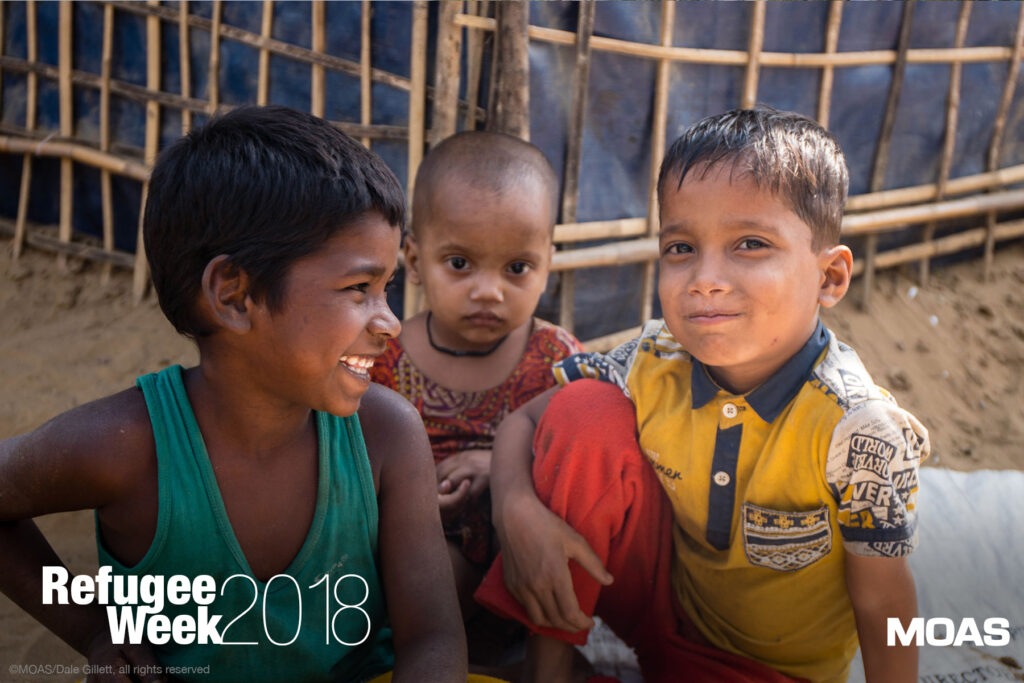This World Refugee Day, over 900,000 Rohingya refugees are living in overcrowded camps in Bangladesh. Having endured extreme violence and persecution in Myanmar and long, dangerous journeys, they’re now facing the onset of monsoon season, which threatens to devastate the camps.
Each of these people has their own story; today, we share the experiences of Syed and Laila. When violence broke out on 25th August 2017, Syed and Laila were newly-married and expecting their first baby. Now, they live in Unchiprang settlement, trying to forge a safe life for themselves and for their baby daughter Azara. This is their story.
Syed: Our life back in Myanmar was simple, yet we were living in our country. Most of the people from our village in Muangdaw were farmers. My family used to own 12 kani of land where we lived and grew enough rice for our family. Other than rice, we grew potatoes, chilies and other vegetables. Some were fishermen. It was a humble life.
Laila: My father was a farmer, like most of the others from our village. My mother died of an illness when I was nine. After that, my father remarried, and with my step-mother, and later with a step-brother and step-sister, my life was very difficult. I knew Syed from our village.
Syed: I married Laila two years back. I liked her from before, and when I was able to grow crops on my land by myself, I asked her to marry me.
Laila: On the day of Eid, the military raided our village when most of the men were gathering at the mosque for the Eid prayer. They shot people indiscriminately and set fire to our houses. We were paralyzed by fear. We did not think we would live another day. I was seven months pregnant at that time. I feared for my child.
Syed: They came just before the Eid prayer. When they came to our house we ran for our lives. My parents and two of my young sisters were caught. I watched them being killed in cold blood.
Laila: Everything happened so fast, we were running for our lives leaving everything we owned. They set everything on fire. It was monsoon season and the journey was terrible. Sometimes we had to cross through waist-high mud and silt. I was 7 months pregnant and it was taking me forever to take each step. I don’t know how we both escaped and made it to this side of the border.
Syed: We are now refugees living in Unchiprang Camp. A month after we arrived here our daughter was born. Now she is two months old and our small family is one of the thousands of families who are living here, trying to survive. Life is difficult here.
Laila: Living in a refugee camp with a two month old child is challenging. Here we live with uncertainty in every aspect of our lives. Food, water, treatment; everything is hard to reach. Even daily household chores like collecting water, getting firewood, and cooking take a lot of time and effort. My husband does most of the hard work – he only lets me do the cooking and take care of the baby.
Syed: The day begins very early here in the camps, just after Fajr prayer. After that we have to start taking care of the daily household work. To collect water I have to go to the water collection points and those are quite a long way from our shelter. There are many people like me who collect water. Sometimes we have to wait in a long queue for hours. There also times when the supply is dry and we have to go to other collection points.
On the days when I collect firewood in the jungle I leave very early. It is quite far where I have to go. After cutting and bundling the wood, I carry it back to our shelter. It’s a long, hard work, and on days when it rains it gets even tougher.
Laila: At home, I do the cooking for the family. The rations we get contain rice, pulses, sugar, salt, onion, potatoes and oil. We have to live on the limited quantity of food we receive. It’s hard to have a good diet here.
I take care of my child. I am always concerned for her health because there are lots of diseases that are spreading in the camp. I have to keep as clean as much as I can. The shelter we live in is flimsy and at night it becomes very cold. At this young age, I am very worried she will come down with something.
Syed: Thinking about the future from where we are now is very hard. We never imagined living as refugees and we are still getting used to life here. We are not allowed to work. We live on what little relief we get. I did not go to school. I thought I would be a farmer like my father. But now I realize that if I had had an education, I could have worked with an NGO.
Though there is not much opportunity for education here, I wish that my daughter will be educated. I wish to give her a better life, not that of a stateless refugee, but of a proper human being. The struggle we’ve been through – I wish she never has to face such a thing in her life.
You can help MOAS provide urgent medical care to people like Syed, Laila and Azara as the monsoon season hits by donating here. Learn about our work in Unchiprang camp here, or listen to our podcast exploring the dangers brought by the oncoming monsoon.
You can also fundraise with friends to become a part of our activist community, or can receive regular updates by signing up to our newsletter at the bottom of this page or following us on Facebook, Twitter and Instagram.

